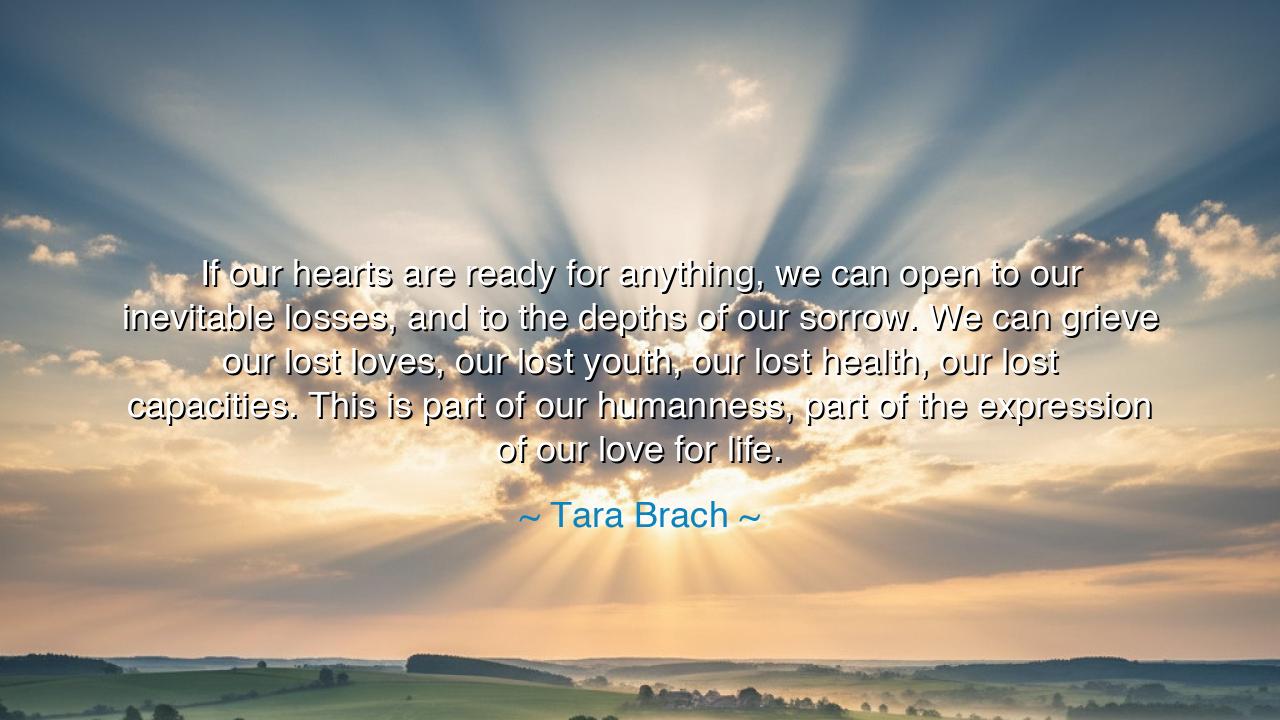
If our hearts are ready for anything, we can open to our
If our hearts are ready for anything, we can open to our inevitable losses, and to the depths of our sorrow. We can grieve our lost loves, our lost youth, our lost health, our lost capacities. This is part of our humanness, part of the expression of our love for life.






Tara Brach, teacher of mindfulness and tender wisdom, has given us this truth: “If our hearts are ready for anything, we can open to our inevitable losses, and to the depths of our sorrow. We can grieve our lost loves, our lost youth, our lost health, our lost capacities. This is part of our humanness, part of the expression of our love for life.” These words are not philosophy alone; they are a map for the soul. They remind us that to live fully is to be wounded, that to love deeply is to lose deeply, and that in the embrace of sorrow we discover the measure of our love for existence itself.
The ancients also knew this truth. In the Book of Job, the righteous man, stripped of wealth, children, and health, rends his garments and cries out in anguish. Yet through his grief, he learns a wisdom deeper than prosperity ever gave him: that loss and sorrow are not signs of abandonment, but woven into the fabric of mortal life. Brach’s teaching stands in this lineage — that we must not turn away from loss, but prepare our hearts to meet it, for it is the price of being alive, and the testimony that we once loved.
History offers us many who bore this burden with courage. Think of Nelson Mandela, who spent 27 years in prison. He lost his youth, his freedom, and the ordinary joys of family life. Yet rather than closing his heart in bitterness, he opened it wider, so that his suffering became not destruction but fuel for reconciliation. His capacity was diminished, but his spirit grew vast enough to hold both grief and forgiveness. In him we see Tara Brach’s wisdom alive: the human heart, ready for anything, transforms sorrow into power.
The quote also reminds us that grieving is not weakness, but an expression of love. To mourn a lost love is to honor the bond that shaped us; to grieve lost youth is to recognize that our years were precious; to weep for lost health or strength is to acknowledge the miracle they once were. Every tear we shed is a tribute, not a failure. This is why Brach speaks of grief as part of our humanness — because only those who have truly cherished life can mourn its passing seasons.
Yet many resist this path. They bury their sorrow, fearing it will consume them, and in so doing, they harden their hearts. But Tara Brach counsels us to be “ready for anything.” To live with an open heart is to accept that we will break again and again, and still we will live, still we will love. This readiness does not remove the pain, but it allows the pain to shape us without destroying us. Like iron placed in the fire, the heart becomes tempered, stronger, and more luminous through its suffering.
What, then, is the lesson for us? To prepare the heart, not by avoiding love or loss, but by cultivating presence and compassion. Let us practice gratitude daily, so that when something is taken, we know it was truly seen and cherished. Let us sit with our grief rather than fleeing from it, and let us offer presence to others in their mourning, so that no one carries sorrow alone. To be fully human is to weep, to ache, and yet to continue loving life with all that remains.
So, children of tomorrow, do not fear your inevitable losses. They will come — as sure as winter follows autumn, as sure as night follows day. But let your hearts be ready. For if you can meet sorrow openly, you will discover that even in grief, there is beauty; even in endings, there is love; even in the dust of what is gone, there is the shimmering testimony that life was lived, and it was worth everything.






AAdministratorAdministrator
Welcome, honored guests. Please leave a comment, we will respond soon